Memphis Grizzlies Bring in Mario Hezonja from Portland Trail Blazers
November 21, 2020 - The latest on Croats in the NBA, as the Memphis Grizzlies bring in Mario Hezonja from the Portland Trail Blazers.
Index.hr reports that Mario Hezonja is the new player of the Memphis Grizzlies, ESPN journalist Adrian Wojnarovski announced on Friday. Hezonja was traded to Memphis for Enes Kanter who is returning to Portland after two years.
Portland is acquiring Boston's Enes Kanter in a three-way deal with Memphis, sources tell ESPN. Memphis gets Mario Hezonjia and 30th pick (Desmond Bane) from draft night deal as part of trade too. Celtics get a future Memphis draft consideration.
— Adrian Wojnarowski (@wojespn) November 20, 2020
It will be Hezonja's sixth season in the NBA league next season after being selected as the fifth pick in the 2015 draft. He spent the first three in Orlando, one in New York, and last year in Portland. Next up is Memphis.
Last season, Hezonja played in 53 games, four of which he started in the top five thanks to a series of injuries that crippled the Blazers. He averaged 4.8 points, 3.5 rebounds with a shots in play percentage of 42% and a 31% success rate for three points in 16.4 minutes on the court.
Thank you, @mariohezonja ❤️ pic.twitter.com/6QLjySaGIB
— Portland Trail Blazers (@trailblazers) November 21, 2020
A few weeks ago, Hezonja angered many Croats when he took to his social media to say that he does not play for the Croatia national team because he is tired and doesn't enjoy it. Croatia coach Veljko Mršić then said that he would not call him up again, but not because of that statement, but because he did not answer his calls. Hezonja then trolled HKS in the story about the esport national team, when the Federation said that Hezonja could not play for it because he did not register on time. Hezonja replied: "How come I didn't? I called, but you didn't answer."
Of the other Croatian players, Bojan Bogdanović has a contract with the Utah Jazz, Ivica Zubac with the LA Clippers, and Luka Šamanić with the San Antonio Spurs. Darijo Šarić's contract with the Phoenix Suns has expired and he is now a limited free agent, which means that he can negotiate with other clubs, but the Suns can still match the offer and to keep him. According to the latest information from America, the Suns would gladly keep him for a reasonable price.
Ante Žižić and Dragan Bender returned to the Euroleague and play for Maccabi. Bender signed a three-month contract so he could return to the NBA in the event of a good offer, but so far he has not been satisfied in Israel either.
To read more about sport in Croatia, follow TCN's dedicated page.
Zagreb Advent Run: Different Edition for Fifth Anniversary
November 21, 2020 – This year's edition of the favorite costume race Zagreb Advent Run is conceived as a three-day event in a completely new format adapted to the epidemiological situation.
The fifth anniversary of the Zagreb Advent Run race will take place over three days, from December 18 to 20, and costumed participants will be able to run the leg of their choice, in smaller numbers with friends, family members, and pets.
To avoid gathering more people in one place, the official start of the race will not be held in the same way as in previous years. Participants of the Zagreb Advent Run will independently choose the length and route of the race, and the final goal will be traditionally in front of the hotel Westin Zagreb. Upon entering the finish line, participants will receive official T-shirts and well-deserved medals.
"The global coronavirus pandemic has changed the daily lives of citizens and the way almost every social sector functions, and racing is no exception. Despite the great desire for the Zagreb Advent Run 2020 to be held as in previous years in a more numerous and cheerful edition, the health of our participants is certainly in the first place. Therefore, we decided to continue the tradition of this race, but in a form adapted to the current epidemiological situation, keeping in mind the maximum safety of all race participants," announced Mario Petrović, CEO of Millennium Promotion and one of the race organizers.

PR Zagreb Advent Run
The organizers of the race, Millenium promocija and Run Croatia invite citizens to run this year's Zagreb Advent Run in selected costumes and ask participants to gather in small groups, keeping in mind the protection of their families and friends.
"Zagreb Advent Run has turned into one of the most massive Advent races in Europe. This year, the coronavirus pandemic changed all the plans we had to mark the fifth anniversary of the race. However, aware of the immense desire of citizens to bring the famous Advent joy and atmosphere in 2020, we decided to organize a modified version of the race," said Berislav Sokač, one of the organizers of the race and the originator of the Zagreb Advent Run.
Like every year, this year's Zagreb Advent Run has its humanitarian aspect. This time, all participants are invited to support the Ana Rukavina Foundation. The foundation was established in memory of the late journalist Ana Rukavina, who sent one great wish to the public – that of life. The Foundation bases its work on this very desire and, through the humanitarian action „Želim život“ ("I want life"), raises funds for the Foundation activities and the provision of assistance to hematological patients throughout Croatia.
During December, a humanitarian telephone line will be opened and all interested parties can call. All of the Zagreb Advent Run participants are invited to support this commendable action on the eve of the holidays.
"Through joint efforts and the nobility of our citizens, in this way we can provide the funds needed for further collection of samples for the Croatian Registry of Voluntary Hematopoietic Stem Cell Donors and professional development of young doctors in hematology and other related specializations," said Marija Rukavina, the Foundation Manager.
All those interested can register on the Zagreb Advent Run website.
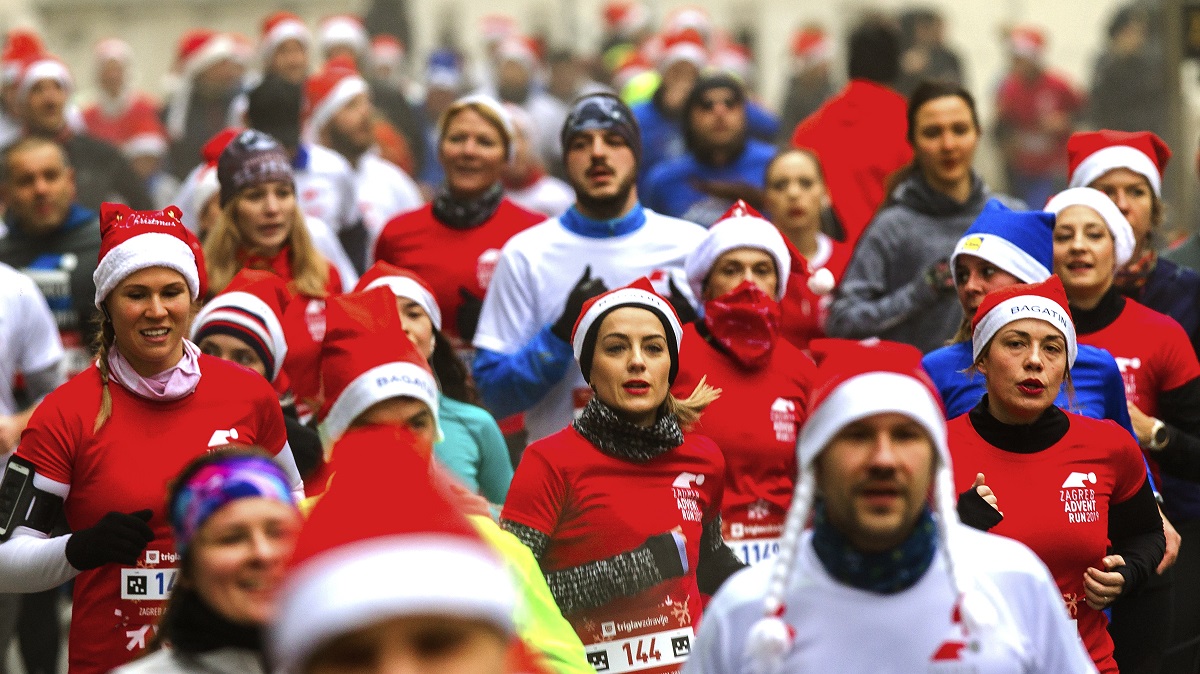
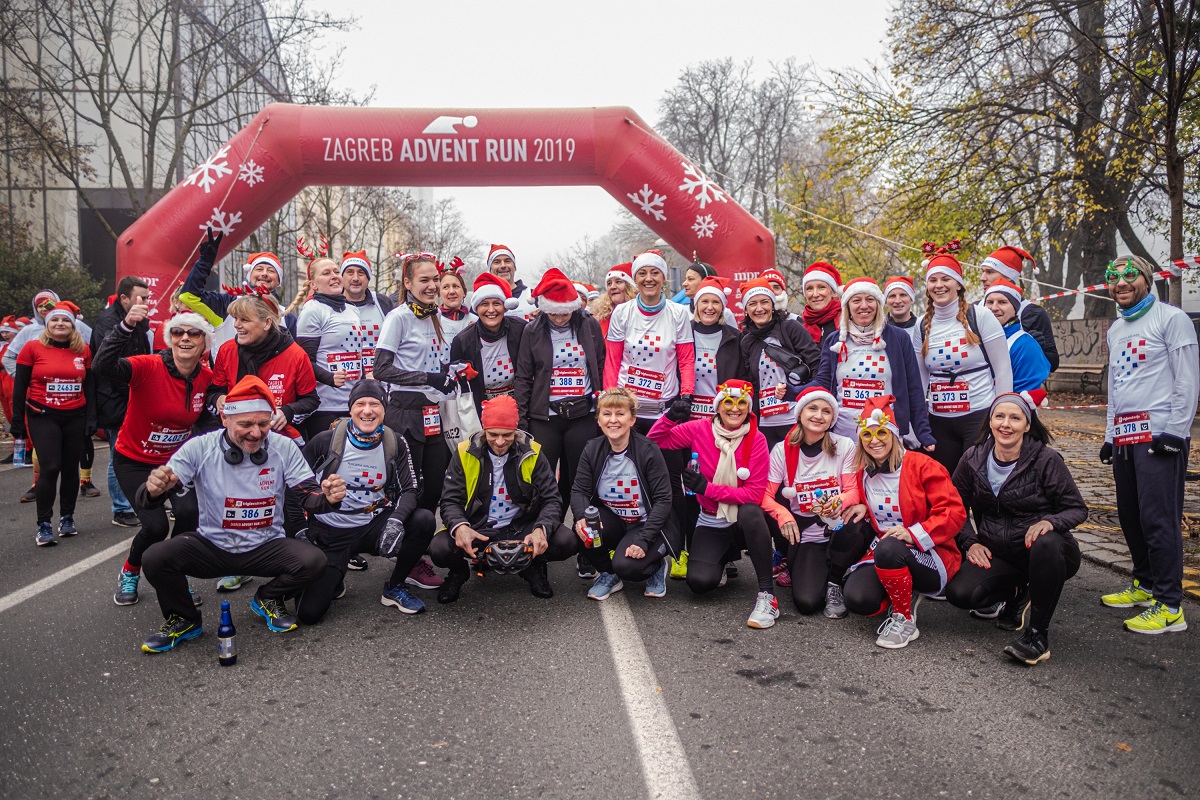
To read more about lifestyle in Croatia, follow TCN's dedicated page.
UNICEF Recognizes Arena Hospitality Group for Respecting Children's Rights
November 21, 2020 - UNICEF recognizes Arena Hospitality Group as a Croatian company with responsible business practices for children.
HRTurizam reports that to mark World Children's Day, the UNICEF Advisory Board for Children's Rights and Corporate Social Responsibility presented examples of Croatian companies that show good business practices for children at an online conference.
The project aims to find out how individual companies in Croatia respect children's rights in practice, strengthen the visibility of business practices of Croatian companies that respect the child's rights and welfare, and thus motivate other companies to more actively engage in children's rights.
The project was implemented through practices and policies in various areas - from a workplace tailored to children and families through products and services that support children's rights, contribute to the community, and preserve the environment in which children grow and develop.
One of the positive examples comes from the Croatian tourism sector.
Namely, Arena Hospitality Group has been recognized by UNICEF as a Croatian company with responsible business practices for children.
Arena Hospitality Group is one of the first companies in Croatia to adopt a policy to protect children in its business processes and activities.
"We are proud that Arena Hospitality Group was selected among 14 companies as the only hotel and tourism company that demonstrated good and positive practices towards children," said Arena Arena Hospitality Group (AHG), adding that AHG's child protection policy defines in great detail the circumstances, responsibilities, legal basis, processes of action and all other information necessary for an adequate response.
"Although called a policy, the document goes beyond policy because it defines operational processes and contains elements of the Code of Conduct, Rules of Procedure for Children - especially in the field of employment of minors," said the Arena Hospitality Group.
To gain knowledge about the socially responsible business that respects and promotes children's rights, AHG representatives attended UNICEF's CSR Academy, "Children are our most important job" in 2019. Following the training, the AHG Group, in cooperation with UNICEF, began assessing the impact of its business on children's rights (Children's Rights Impact Assessment).
AHG implements and will implement policies and practices that contribute to children's rights, monitor their implementation and report on results, and act correctively to benefit children. As part of its annual financial and non-financial reports, AHG also provides an overview of the entire corporate social responsibility and includes activities carried out concerning children and the protection of their rights.
"We want to be the initiators of positive changes and good practices in our environment, and we hope that more and more companies will follow the same path. We believe that the greatest value for the future is the creation of a long-term sustainable and responsible business model, which includes, among other things, a child protection policy based on the principles of protecting children and their health, safety and well-being, and development. We met and started working with UNICEF a few years ago on another project, but since then, we have seen them as a new friend and a “strong” partner with the best international experience in guiding a company like ours. We believe that our joint journey has just begun… because, let's not forget, children are our most important job," said Manuela Kraljević, Member of the Management Board and Director of Marketing and Sales of AHG.
Approximately 800,000 children under 18 live in Croatia, which is about 20% of the total population. There are almost no companies that do not directly or indirectly affect their lives.
In her review of Croatia's current situation regarding business practices responsible for children, the head of the UNICEF Office for Croatia, Regina M. Castillo, pointed out that every company - whether small or large - directly or indirectly affects the lives of children.
"That is why it is imperative that the business sector, through its daily business and in developing strategic plans, has in mind the best interests of the child. We are proud of this initiative, which through cooperation with young people has shown for the first time how some Croatian companies implement responsible initiatives for children and their families. We believe that the isolated business practices will serve as an inspiration for other companies to implement similar initiatives in Croatia and maximize results for children."
To read more about lifestyle in Croatia, follow TCN's dedicated page.
Croatia Basketball Team Begins European Championship Qualifications, Player List Announced
November 21, 2020 - The Croatia basketball team travels to Istanbul on Sunday, November 23, for a new cycle of qualifications for the European Championship.
According to stringent rules, the qualifications will be played in a 'bubble, so as not to risk the health of players, coaches, referees, and the rest of the delegations. Croatia national team members will only move from the hotel to the hall and back, in a special bus and without interacting with anyone outside their own delegation, except, of course, during the official game.
Before the team heads to Turkey, Croatia national team coach Veljko Mršić, despite all the challenges that are unquestionably posed to the national team, but also sports in general, is determined and currently focused on only one goal: going to the European Championship.
"I expect to provide good games and, given the good outcome of the previous windows, our goal is to secure a place in the European Championship now," the coach began.
"But it’s hard to plan. There are many unknowns, another round of coronavirus testing awaits us before departure, there are very few days of preparation, and we will only see the strength of the rival teams on the spot. In this cycle, we will play against Turkey and Sweden. It is a pity that we are in this current epidemiological situation because we were supposed to play Turkey at home, in front of our audience. As for the list of players, we waited to announce it until the first test results. Fortunately, only a small number of players were positive, so more or less everyone we wanted is on the list. "
In the upcoming qualification cycle, coach Veljko Mršić will count on the following players:
BILAN, Miro - Dinamo Sassari
DREŽNJAK, Mateo - Cibona
GABRIĆ, Tomislav - Enea Astoria
JORDANO, Antonio - Vrijednosnice Osijek
KRUŠLIN, Filip - Dinamo Sassari
MARČINKOVIĆ, Pavle - Split
MARIĆ, Marin - BC Lietkabelis
MAVRA, Dominik - Zadar
PERKOVIĆ, Toni - Split
PRKAČIN, Roko - Cibona
RADIĆ, Ivica - Anwil Wloclawek
RAMLJAK, Ivan - ŚLĄSK
ROGIĆ, Roko - Mitteldeutscher BC
ŠAKIĆ, Željko - Avtodor
STIPČEVIĆ, Rok - Krka Novo Mesto
UKIĆ, Roko Leni - Cedevita Olimpija
VRANKOVIĆ, Antonio - Split
* There are 17 players on the list, and 14 travel to Istanbul.
EUROPEAN CHAMPIONSHIP QUALIFICATION MATCHES
11/27/2020 at 17:00 (19:00 in Istanbul): Croatia - Turkey
11/29/2020 at 18:00 (20:00 in Istanbul): Sweden - Croatia
Source: HKS
To read more about sport in Croatia, follow TCN's dedicated page.
"We Can Stop Healthcare System Collapse, But We're Not Wanted Even During Pandemic"
November 20, 2020 - Petra has been waiting for her internship for a year now. She often meets Maja at the employment Bureau, who has been hoping for an internship for two years. Besides her, Petra sees hundreds of other colleagues who were once just like her, the best students of their generations. Despite the endless stories about there being a shortage of medical staff, these same healthcare workers are not being seen as essential to start work, even during the pandemic.
After graduating, they are required to complete a one-year internship, after which they receive a license with which they can be employed. It all seems fine, but internship places hardly open up, and when they do, they lack or some other set up has already been previously arranged.
"The internship can be cancelled," says Petra B., a medical laboratory diagnostician. "As it's a professional study, as part of the study, we're obliged to do a professional internship, that's over 500 hours in different types of laboratories." As such, during school alone, they get acquainted with the job and gain experience working in the laboratory.
Some of the bachelors in physiotherapy, occupational therapy, medical laboratory diagnostics, radiological technology, or sanitary engineering wait for an internship for up to two years, which means they have spent that period browsing on hospital and employment Bureau websites, just waiting for a vacancy. After graduation, many of them exercise their student rights and work for three months in shops, cafes, restaurants, and other places unrelated to their profession. When those three months pass, they're simply sentenced to sit and twiddle their thumbs at home. To get the right to an internship, they mustn't be employed outside of their profession, and it is mandatory to register yourself on the Croatian Employment Service's (CES) unemployment register.
The problem with internships is not only in regard to gaining experience, but that it isn't even possible - it's obligatory to do it, but hospitals aren't obliged to announce a tender and hire an intern. That is, no one guarantees them a time period in which they must wait, and when they can get started with work; months and even years can pass, leading to yet another burning problem - labour shortages.
Not everyone agrees with the abolition of internships, despite the many issues with it. Bachelor of Radiological Technology, Ana K., with all the hours of professional practice she now has under her belt, doesn't feel ready to enter the labour market with such responsibility. She believes that internships are a good experience and an excellent opportunity to learn and improve one's knowledge and skills.
"But, if it's obligatory, then it should be ensured that every person who finishes school automatically gets a place in a hospital and does that internship, and not just do it as it is done now - there are too few places for the number of graduates," says Ana. K., who, as an alternative, proposes shortening the length of service to give as many healthcare professionals as possible the opportunity.
The problem of obtaining an internship has existed for many years in Croatia. Still, as the demand for healthcare workers increases during the pandemic and even retirees are being called upon, bachelors are also waiting for a call, but it hasn't yet arrived. On the contrary, this year, the internship measure was completely suspended until the autumn when the quotas for healthcare professionals were adopted. The total quota for healthcare professionals is 170 employees, including 99 employees in hospitals, 50 employees in health centres, and 21 employees in the Institute of Public Health.
The CES recorded 1277 new unemployed people in the healthcare sector this year. If we take into account that the Medical Polytechnic in Zagreb alone enrolls about seven hundred students every year, it means that a similar number of them are waiting for an internship every single year, in addition to those who graduated in previous years and still haven't received an internship. In addition to Zagreb, health studies also exist in Varazdin, Osijek, Rijeka, Split, Bjelovar and Karlovac.
Physiotherapist Maja B., who has been waiting for her internship for two years now, is especially saddened that her profession is not considered useful even during the time of the pandemic. However, this situation prompted them to raise their voices so that the Ministry of Health could hear them.
"After numerous appearances in the media, interviews and sending letters to the Ministry, they finally remembered us and started with their 'mobilisation' and invited us to work in the Zagreb Arena, which is open as an additional capacity to receive those who are unwell,'' says Maja, who thinks it would be great if that work was recognised as an internship, regardless of its duration. "We help the state, save the healthcare system from collapsing, the state saves on salaries because they'd pay us for maybe 3-4 months, not for a year, and we'd be recognised for our experience much earlier than we would normally. It would be good for us, and also good for them,'' concludes Maja, although she is aware of the fact that this is difficult to achieve.
Although the Republic of Croatia is a member of the European Union, it hasn't abolished internships after college like other member states have. As a reminder, students have to do over 500 hours of practical work during their studies - not only at the faculty but also throughout hospital wards, nursing homes, laboratories, and in various other conditions. However, there is no internship for doctors of medicine and bachelors of nursing in the Republic of Croatia. The study of nursing is part of the Medical Polytechnic of Zagreb, as well as the previously listed fields that are required to complete an internship and earn a license. They are exempted from the internship due to their fifth year of high school, during which they acquire the necessary practical knowledge to start working.
Dissatisfied that the internship as an obligation was not secured, they launched a petition to cancel the internship, which has so far collected over 5,000 signatures. In addition to bachelors, the petition seeks to include scholars who have completed their education and are waiting to be registered at the CES, as well as the upcoming generations of students who have yet to complete their education.
When Petra's friends heard that she had enrolled in the field of healthcare, the reaction was more or less the same: "Good for you, you'll at least have a job." That was one of the reasons for her enrollment in this faculty. The same is true for most of her colleagues. "However, I didn't think that we still wouldn't be desirable even during a pandemic,'' concludes Petra B.
For the latest travel info, bookmark our main travel info article, which is updated daily.
Read the Croatian Travel Update in your language - now available in 24 languages.
Join the Total Croatia Travel INFO Viber community.
Zagreb Trams - Iconic and Integral to Life in Croatia's Capital
November 20, 2020 – Today is the 20th anniversary of the completion of the Zagreb trams network. Namely, on this day in 2000, the last current line from Jarun to Prečko was opened. To celebrate, we take a look at the iconic, blue trams of Zagreb
It's all too easy to take for granted the things you see every day. That's certainly true of city residents in their feelings for Zagreb trams. As it currently stands, the Zagreb trams network was completed on 20th November 2000, when the existing line to Jarun was further extended to Prečko, which lies to the west of the city centre. In the two decades that have followed, Zagreb trams have cemented their place as an icon of the city, have helped changed the cityscape of Zagreb and have facilitated the friendships, education, careers, relationships and businesses of the Croatian capital over millions of journeys. All without much fanfare or celebration.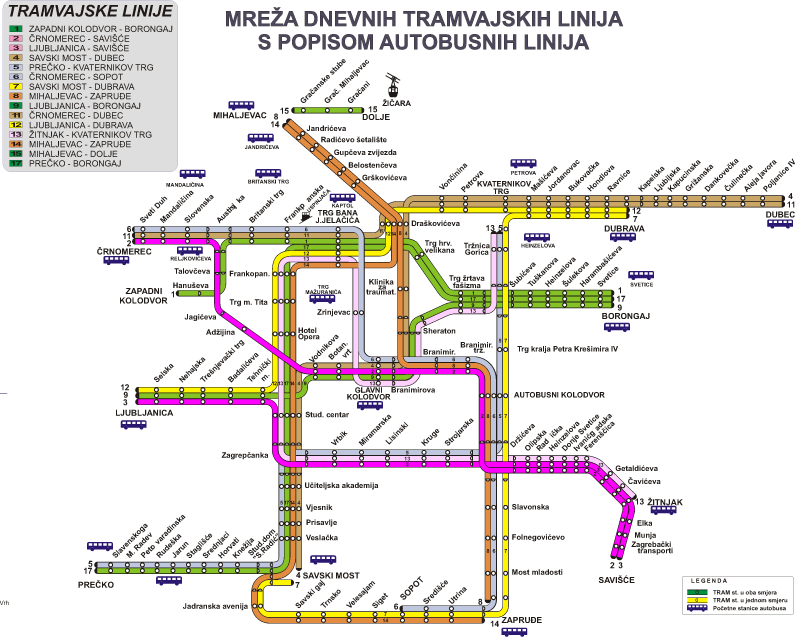 The Zagreb trams network
The Zagreb trams network
The Zagreb trams network consists of 15 lines which connect suburbs as far west from the centre as Prečko (8 kilomtres), as far east as Dubec (8 kilometres), north to Mihaljevac (3 kilometres) and south to Avenue Dubrovnik in Novi Zagreb (an additional line, running further south to Velika Gorica, servicing Zagreb Franjo Tudman airport, is planned). Throughout the night, four lines remain, connecting essential workers, night-time workers and late-night revellers (although they are sometimes replaced by night buses due to maintenance works).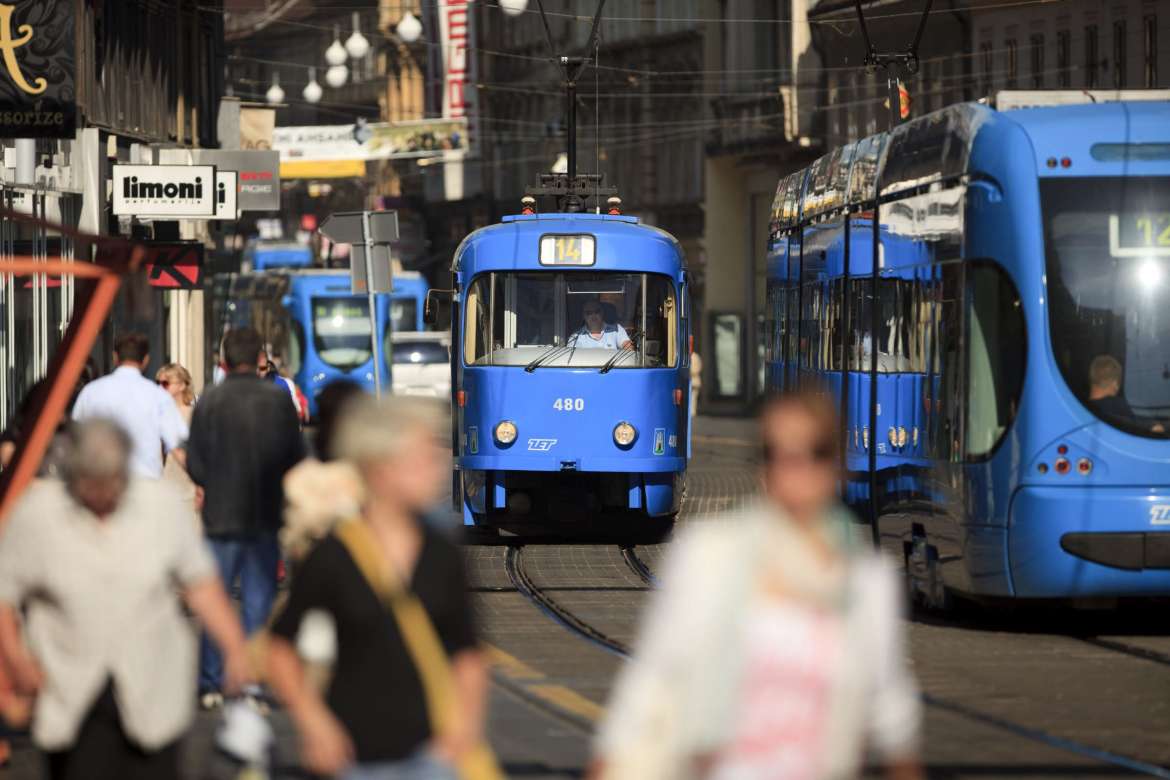 © Romulić & Stojčić
© Romulić & Stojčić
The completion of the line to Prečko catalysed the expansion of the westerly-lying suburbs of Špansko and Prečko. The change visited upon the rest of the city by the Zagreb trams network has been no less fundamental. Certainly, at weekends, Zagreb can confidently claim to be a 24-hour city because of its trams. Day or night, no place within the city suburbs is too far to reach because of Zagreb trams.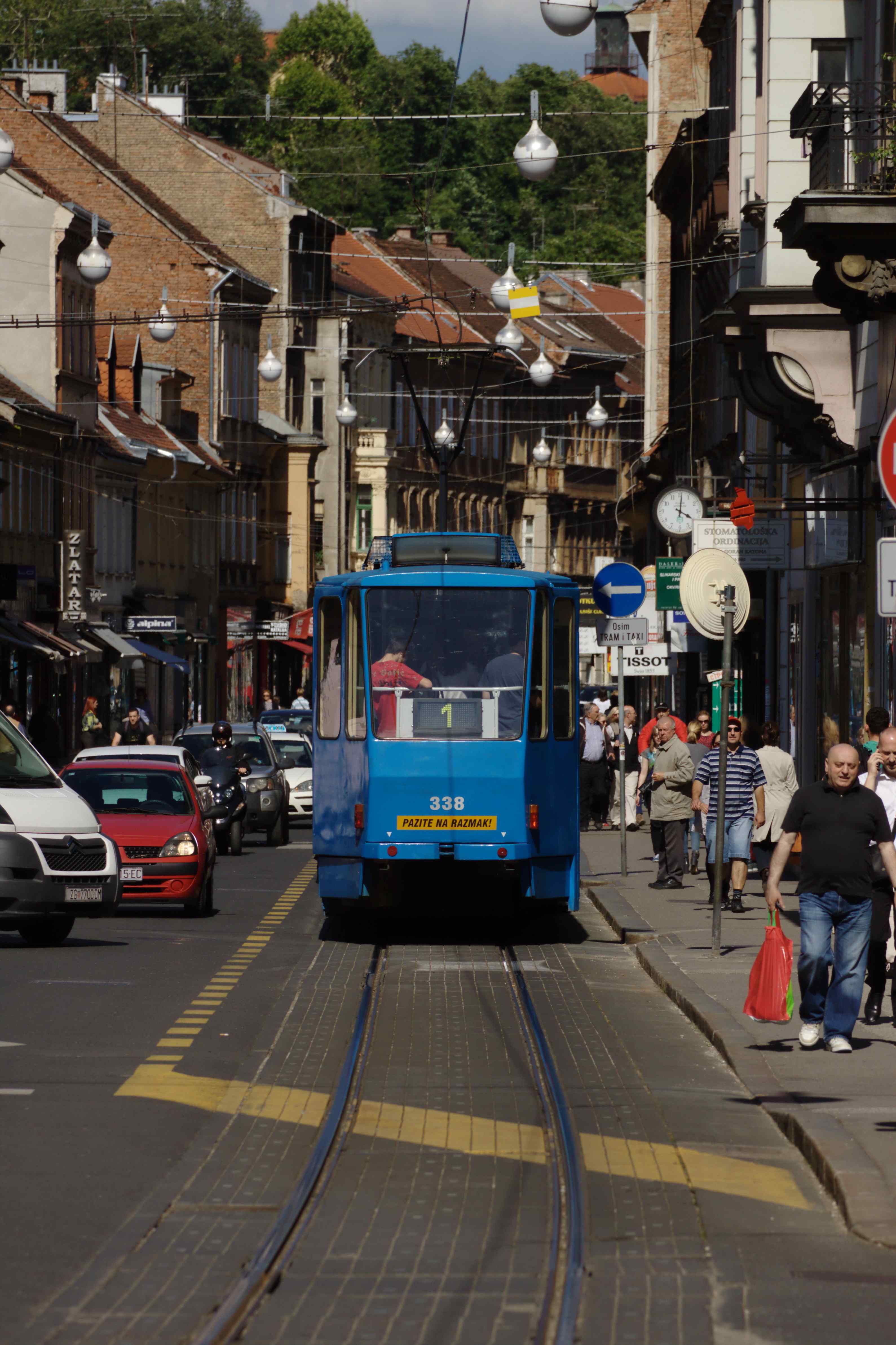 © Aktron / Wikimedia Commons
© Aktron / Wikimedia Commons
So reliable and well used are Zagreb trams that it's perhaps understandable why they are sometimes taken for granted. Whole generations now living in the city do not even know a Zagreb without a tram network. Its importance to all was put into sharp focus during the early part of 2020 when the Zagreb trams network was temporarily closed in response to the COVID-19 pandemic. Perhaps only then was the true scale of integration between Zagreb trams and the lives of city residents truly recognised. 'You don't know what you've got 'til it's gone.'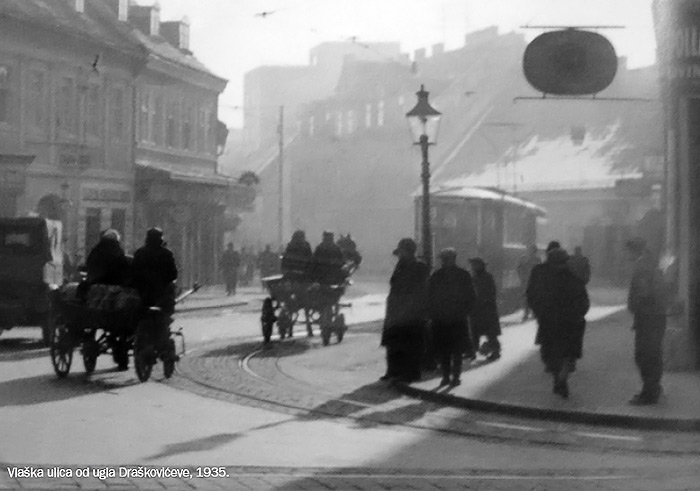 Zagreb trams on the corner of Vlaška and Draškovićeva streets in 1935 © Public domain
Zagreb trams on the corner of Vlaška and Draškovićeva streets in 1935 © Public domain
Lest we forget to give credit where credit is due, here are some interesting facts about Zagreb trams.
The Zagreb trams network was started in 1891 with the opening of the first line. Back then, the trams were pulled by horses - the electric tram didn't debut in Zagreb until 1910. The first journey started at the site of today's Technical Museum and the first track ran for some 8-kilometres. So fascinated were Zagreb residents with the introduction that some 20, 000 passenger journeys were made on the second day. The population of Zagreb at the time was 40, 000.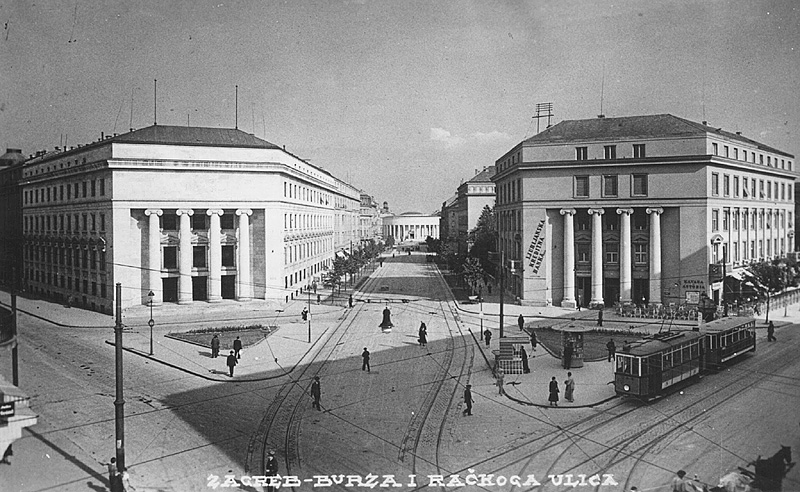 The route from Draškovićeva to Džamija in the 1930s © HappyV
The route from Draškovićeva to Džamija in the 1930s © HappyV
Osijek in Slavonia, east Croatia, was the first city in the country to have trams. The first international railway line into Croatia was built to facilitate holidays on the Kvarner coast, but the rail line ended in Rijeka. The upper echelons of Austro-Hungarian society who took this train were transported to their preferred destination – Opatija – by tram.
The most-modern low floor trams that now run in Zagreb were introduced in 2005.
There are two separate tram stations in Zagreb which have the same name – there are Heinzelova stations on the lines both to Savišće and Borongaj.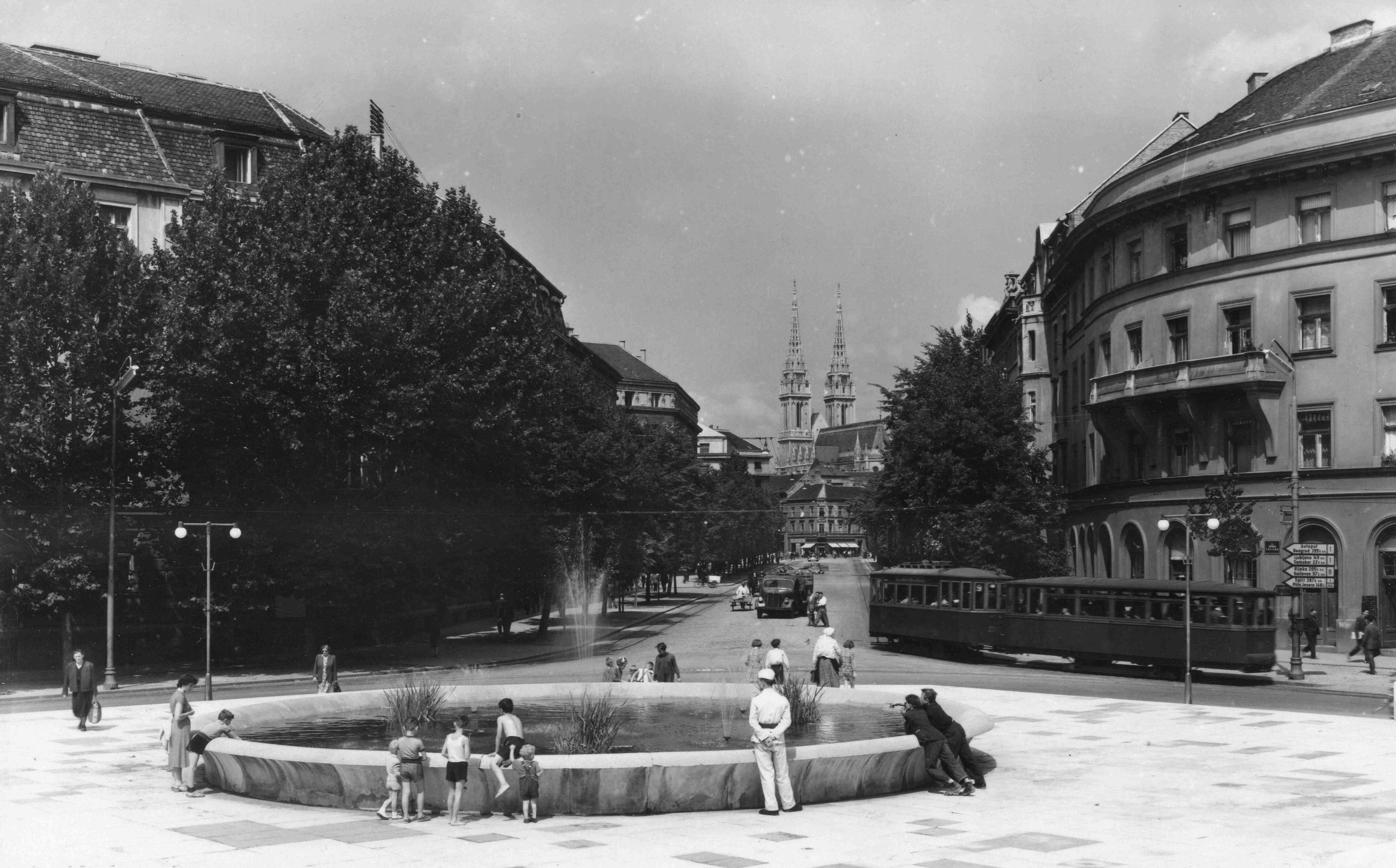 The view from Džamija up to Draškovićeva and the cathedral in 1947 © Romák Éva
The view from Džamija up to Draškovićeva and the cathedral in 1947 © Romák Éva
The Zagreb trams network has 116.3 kilometres (72.3 miles) of metre gauge track. It is the same track all over the city, except for the line which runs north to Mihaljevac, which is unique. This line is both the fastest and the shortest in the Zagreb trams network. It services some of the most desirable Zagreb suburbs in which to live. But, of course. The inclusion of the Mihaljevac line brings the track total to 120 kilometres.
Children under the age of six do not require a ticket to ride on Zagreb trams.
There are six different types of tram currently running on the network. Zagreb residents have given nicknames to different models over the years – Đuro was named after a factory that made it, Bik, meaning bull, got its name because it was stronger than older models, Čeh was named after Czechoslovakia, the country where it was produced, Katica, Genšer and Zeko meaning bunny. Everyone likes the most modern trams in summer, because they have air conditioning but, in winter, city residents greet with joy the approach of older models on their route – the seats are heated to a toasty temperature.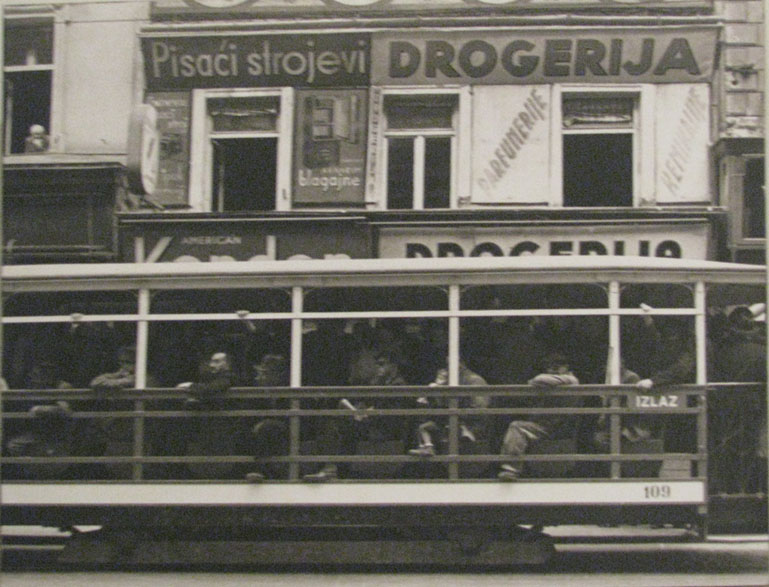 A photograph of how the open carriages of Zagreb trams used to look. The original of this photograph can be found in © Zagreb City Museum
A photograph of how the open carriages of Zagreb trams used to look. The original of this photograph can be found in © Zagreb City Museum
The longest single direction journey you can make on Zagreb trams is between Prečko in the west of the city and Dubec in the east. The journey takes around 76 minutes. You have to change tram only once to make this journey.
Apart from being the most environmentally friendly motorised public transport option in the city, the trams have massively contributed to Zagreb being a modern eco-friendly capital. Many city tram networks run down the middle of roads. While some lines in Zagreb are also placed here, many instead run at the sides of roads. This positioning – plus the way the lines sit in the road – make them problematic for cyclists. And this is partially the reason why Zagreb has 220 kilometres of dedicated cycle paths which exist not on the roads, like in other cities, but on the pavements.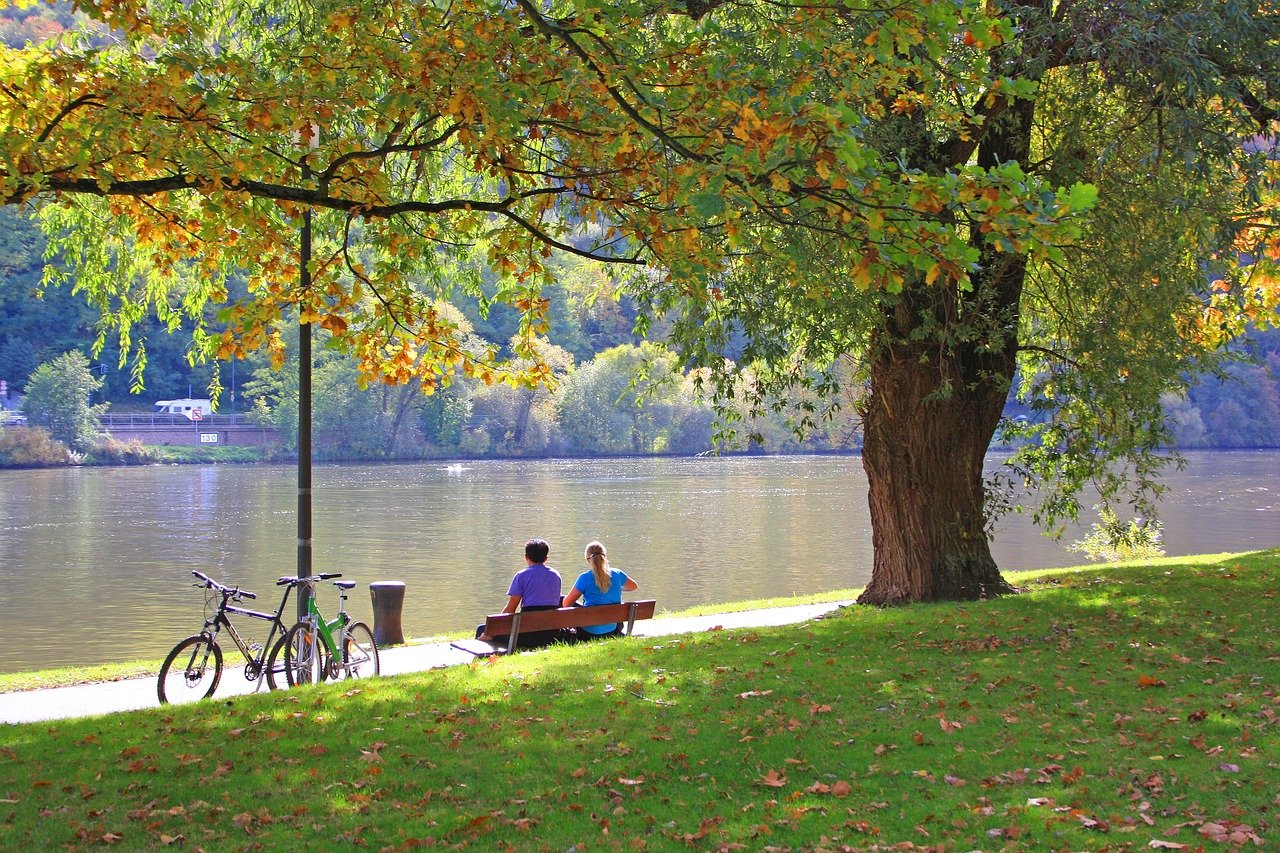 Zagreb's generous 220 kilometres of dedicated cycle paths come partially as a result of the positioning and construction materials of the Zagreb trams network © G Schneider
Zagreb's generous 220 kilometres of dedicated cycle paths come partially as a result of the positioning and construction materials of the Zagreb trams network © G Schneider
One of the world's worst tram accidents happened in 1954 on the Zagreb network. The tragedy took place on the old, steep stretch running near Mirogoj cemetery. Nineteen passengers were killed and thirty seven were severely injured.
During the day, each line runs on average every 5–10 minutes. Almost all stations on the Zagreb tram network sit on at least two lines.
Zagreb's tram network transported 204 million passengers in 2008.
A few years ago, the lowest fare tram ticket was 10 kuna. Zagreb trams were then often ridden by people without a ticket (and still are). The company who runs the tram network, ZET, decided to decrease the price of the lowest ticket to 4 kuna. Since doing so, many more people buy a ticket for Zagreb trams. You can travel for 30 minutes on any tram or trams with a 4 kuna ticket.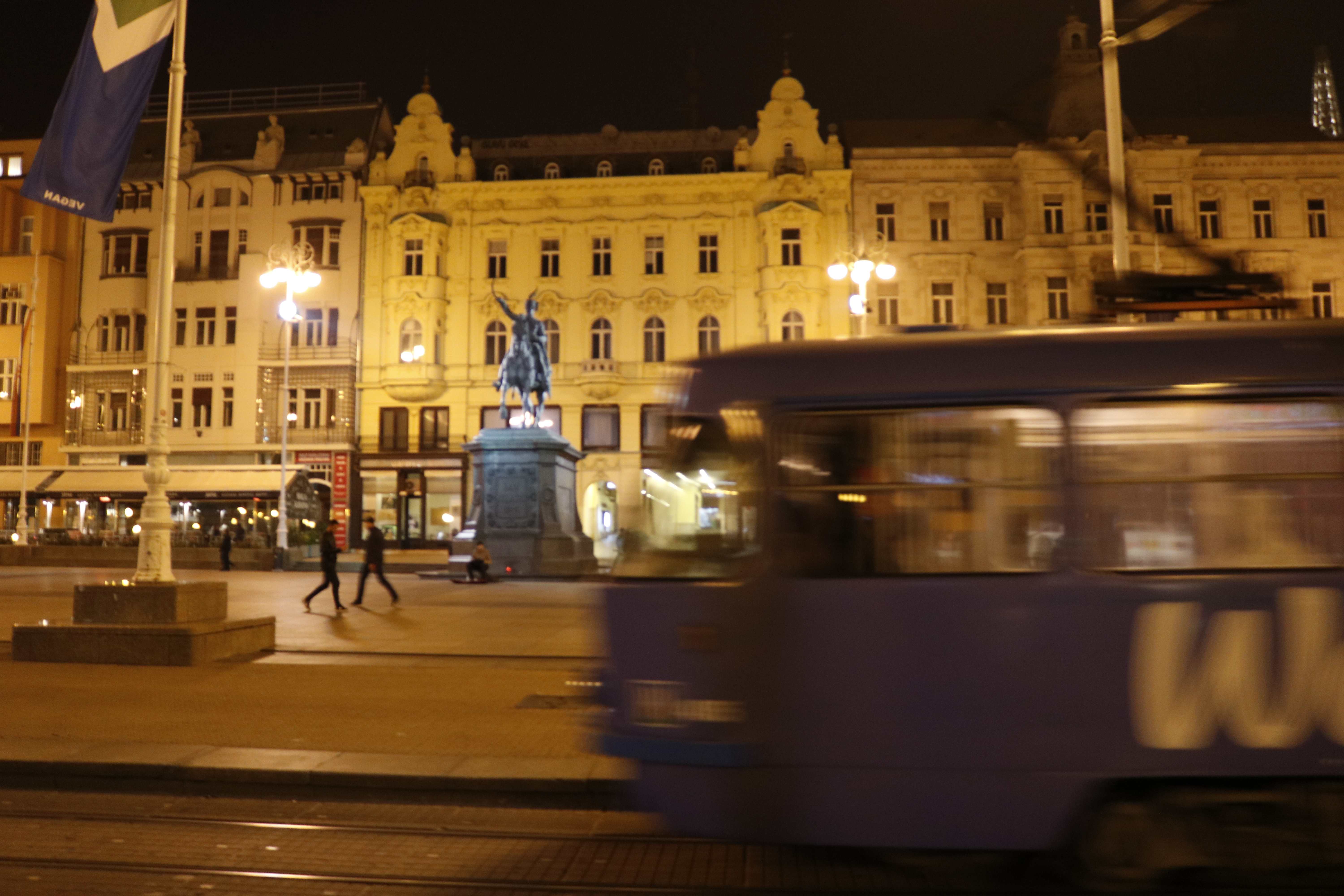 © Marc Rowlands
© Marc Rowlands
All uncredited photographs courtesy © ZET
Contracts on EU Funds Worth HRK 73 mn Presented to Health Ministry, Zagreb Hospital
ZAGREB, November 20, 2020 - Regional Development and EU Funds Minister Natasa Tramisak on Friday presented contracts on EU funds worth HRK 73 million for new healthcare projects to Zagreb's Dr Fran Mihaljevic Hospital for Infectious Diseases and the Health Ministry.
"The coronavirus pandemic has raised awareness of the need to invest more in the health system, in Croatia and the EU alike. We are therefore using all available money from European structural and investment funds," Tramisak said at the contract-awarding ceremony.
She said the contracts would help the hospital continue boosting its capacity and procuring new equipment as well as the Health Ministry buy the necessary equipment, such as a linear accelerator for the KBC Rebro hospital.
Tramisak said projects worth more than 3 billion kuna had been agreed for the health system, with 2.7 billion being grants.
The latest contracts are valued at more than HRK 73 million, and almost 100% of the contract value are grants.
The minister said that apart from a HRK 369 million contract signed last week for the procurement of protective equipment, her ministry had asked the EU Solidarity Fund for an additional €39 million if the procurement of additional equipment should prove to be necessary.
The contract for the Health Ministry is worth HRK 23.7 million and will be entirely financed with EU funds.
The contract for the Dr Fran Mihaljevic hospital is worth HRK 50 million, and EU grants amount to HRK 49.6 million. The funding will help adapt part of the hospital infrastructure and almost half of the funds will be used to buy valuable diagnostic equipment, the hospital's director, Alemka Markotic, said.
MEP Sokol and Suica Announce New Long-Term EU Vision for Rural Areas
ZAGREB, November 20, 2020 - The European Commission will develop a long-term vision for rural areas to enable them to make the most of their potential, which will also benefit Croatian villages and bring back young people, the European Commission's Vice-President Dubravka Suica said on Thursday.
Suica participated in a meeting of the Intergroup on Rural, Mountainous and Remote Areas & Smart Villages dedicated to a long-term vision for rural areas and creating a comprehensive strategy for their development until 2040, the press office of the European People's Party (EPP) said.
Croatian MEP Tomislav Sokol, vice-president of the intergroup, stressed that the goal of the intergroup was to strengthen territorial cohesion within the European Union, addressing the specific need of rural, mountainous and remote areas.
Rural areas are of the utmost importance for the EU, which depends on them for food, energy and raw materials. In addition, rural areas are a source of creativity and innovation in which a great part of European cultural and natural heritage is based, which needs to be preserved. The importance of this intergroup's work is exceptional: rural, mountainous and remote areas make up 80% of the territory and nearly 60% of EU population lives in them. As for Croatia, about 90% of the territory is rural and 10% urban, Sokol said.
He stressed that he would personally, and through the intergroup, work on making rural areas attractive and bringing young people back to them.
Suica said that the Commission would develop a long-term strategy for rural areas to enable them to make the most of their potential and support them in facing their unique set of issues, from demographic changes to connectivity, risk of poverty and limited access to services.
A hundred million people in the European Union live in rural areas, half of the territory is rural. Our aim is to offer them a new perspective of a green, digital and demographic transition. It has become less important where you are as long as you are connected, Suica said.
Sokol said that rural, mountainous and remote areas require special commitment and attention and called on the European Commission to adopt the European Rural Agenda with ambitious and concrete political goals that will be transformed into concrete activities on the ground.
By 2040 we will strive to make rural areas become attractive places to live and work in, especially for young people, Sokol said.
Tourism Minister Proposes Joint Tourism Working Group to Italian Counterpart
ZAGREB, November 20, 2020- Tourism and Sport Minister Nikolina Brnjac proposed on Friday in an online meeting the establishment of a joint working group for tourism to Italian Culture and Tourism Minister Dario Franceschini, the Ministry of Tourism and Sport (MINTS) has said.
Minister Brnjac and Culture and Media Minister Nina Obuljen Korzinek held an online bilateral meeting with Franceschini, ahead of the fourth plenary session of the Coordinating Committee of Croatian and Italian Ministers, the ministry said in a press release.
Brnjac said that during Croatia's presidency of the Council of the EU a quality discussion had been initiated between member states in the tourism sector, and the need to find a joint plan for overcoming the crisis had been identified.
In the difficult circumstances that hit tourism this year, it is especially important to exchange experiences on the use of EU funds, encourage private-public partnerships and interregional and cross-sectoral cooperation to ensure recovery and resilience, as well as further development and growth of the tourism sector, the Croatian tourism minister said.
She also said that the initiative to better position tourism within the EU, which Croatia had presented in 2018, had attracted great interest and support of Italy and other EU member states.
According to her, Croatia is open to presenting and promoting itself together with Italy in third markets, as well as to sharing knowledge and experience on the technological, legislative and organisational aspects of Croatia's award-winning eVisitor system.
The ministers also agreed that education in tourism was key to strengthening and further developing the sector, and that the exchange of knowledge and good practices in the training of tourism and hospitality staff was very useful for both sides, MINTS said.
39 New Subsidy Agreements Valued at HRK 42 mn Sent to Farmers
ZAGREB, November 20, 2020 - The Paying Agency for Agriculture, Fisheries and Rural Development has sent 29 new agreements to farmers around Croatia related to two measures from the Rural Development Programme for an acceptable investment amount of almost HRK 90 million, for which HRK 42 million has been secured in subsidies.
The Ministry of Agriculture said in a press release that 20 agreements relate to cattle breeding with subsidies valued at HRK 33.5 million, while the total acceptable amount of investments amounts to more than HRK 71 million.
Nine agreements for which subsidies valued at HRK 8.6 million have been made available relate to managing and handling organic fertiliser, while the value of the total investments amounts to HRK 18.6 million.
Projects submitted for support under operations 4.1.1. and 4.1.2 of the Rural Development Programme can amount to €500,000 (HRK 3.75 million) and €300,000 (HRK 2.25 million) respectively, with subsidies covering 50% of the acceptable costs.


